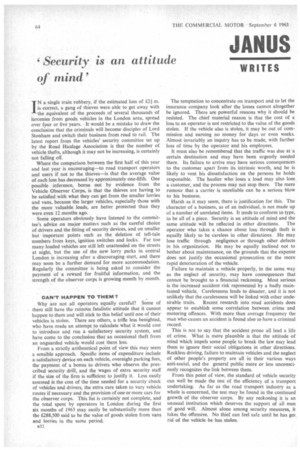CAN'T HAPPEN TO THEM?
Page 66

If you've noticed an error in this article please click here to report it so we can fix it.
Why are not all operators equally careful? Some of them still have the ruinous fatalistic attitude that it cannot happen to them and will stick to this belief until one of their vehicles is stolen. There are others, a trifle less benighted, who have made an attempt to calculate what it would cost to introduce and run a satisfactory security system, and have come to the conclusion that an occasional theft from an unguarded vehicle would cost them less.
From a strictly arithmetical point of view this may seem a sensible approach. Specific items of expenditure include a satisfactory device on each vehicle, overnight parking fees, the payment of a bonus to drivers who observe the prescribed security drill, and the wages of extra security staff if the size of the firm is sufficient to justify it. Less easily assessed is the cost of the time needed for a security check of vehicles and drivers, the extra care taken to vary vehicle routes if necessary and the provision of one or more cars for the observer corps. This list is certainly not complete, and the total spent by operators in London during the first six months of 1963 may easily be substantially more than the £288,500 said to be the value of goods stolen from vans and lorries in the same period.
a32
The temptation to concentrate on transport and to let the insurance company look after the losses cannot altogether be ignored. There are powerful reasons why it should be resisted. The chief material reason is that the cost of a loss to an operator is not restricted to the value of the goods stolen. If the vehicle also is stolen, it may be out of commission and earning no money for days or even weeks. Almost invariably an inquiry has to be made, with further loss of time by the operator and his employees.
It must also be remembered that the traffic was due at a certain destination and may have been urgently needed there. Its failure to arrive may have serious consequences to the customer apart from its intrinsic worth, and he is likely to vent his dissatisfaction on the persons he holds responsible. The haulier who loses a load may also lose a customer, and the process may not stop there. The mere rumour that a carrier is unreliable can be a serious blow to his business.
Harsh as it may seem, there is justification for this. The character of a business, as of an individual, is not made up of a number of unrelated items. It tends to conform to type, to be all of a piece. Security is an attitude of mind and the same attitude will be reflected in other directions. The operator who takes a chance about loss through theft is equally likely to be careless in other directions. He may lose traffic through negligence or through other defects in his organization. He may be equally inclined not to bother about maintenance, on the grounds that the expense does not justify the occasional prosecution or the more rapid deterioration of the vehicle.
Failure to maintain a vehicle properly, in the same way as the neglect of security, may have consequences that cannot be brought to a financial reckoning. Most serious is the increased accident risk represented by a badly maintamed vehicle. Carelessness leads to disaster, and it is not unlikely that the carelessness will be linked with other unde sirable traits. Recent research into road accidents does appear to establish some correlation between crime and motoring offences. With more than average frequency the man who causes an accident is found also to have a criminal record.
This is not to say that the accident prone all lead a life of crime. What is more plausible is that the attitude of mind which impels some people to break the law may lead them to ignore their social obligations in other directions. Reckless driving, failure to maintain vehicles and the neglect of other people's property are all in their various ways anti-social, and the general public more or less unconsciously recognizes the link between them.
From this point of view, the standard of vehicle security can well be made the test of the efficiency of a transport undertaking. As far as the road transport industry as a whole is concerned, the test may be found in the continued growth of the observer corps. By any reckoning it is an unusual institution which deserves the support of all men of good will. Almost alone among security measures, it takes the offensive. No thief can feel safe until he has goi rid of the vehicle he has stolen.
































































































































































































